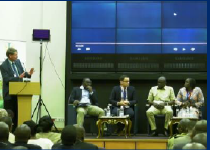
Artisanal and small-scale mining (ASM) employs 100 million people worldwide and accounts for around 20% of both gold and diamond production.
In West Africa, ASM employs millions, but minerals are often sold through transnational criminal network.
“Each year we lose at least 100 tons of gold in West Africa,” said the Mining Minister from the Republic of Niger, speaking at a Regional Conference on Best Practice for the Sustainable Development of ASM. “That is worth $4 billion.”
Because of risks of terrorist financing and money-laundering, West Africa has been increasingly on the radar of international NGOS and governments.
The conference, initiated by USAID and EU-funded project Property Rights & Artisanal Diamond Development (PRADD II), was the first event of its kind in West Africa.
It focused not just on shared problems but ways to harness small-scale mining for growth.
“Small-scale mining is good for the health of our sub-region,” said Tony Aubyn, Ghana’s Director of Mineral Resources. “It provides jobs and development, but we must do it right.”
Aubuynn and over 200 participants from 200 countries shared experiences and advice, focusing on the need to look at the full supply chain and not just diggers, formalize the activity instead of repress it, and promote win-win solutions so that large-scale and small-scale mining can coexist.
“Even if we employ the entire army and police, we will not be able to put it under control with force alone,” said Stephen Dorbor, Vice Minister of Mines from Liberia.
Industrial mining companies, such as majors like American company Newmont, also participated and shared their challenges with ASM.

